By Rick Vacek
GCU News Bureau
If the older buildings at Grand Canyon University could talk, they would be fascinating conversationalists.
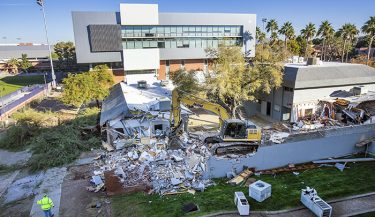
There aren’t many of them left, and “old” is a relative term. On a campus with so much construction in the last 10 years, anything from the 20th century qualifies as old.
And while they don’t stand nearly as tall as the gleaming, state-of-the-art facilities that quickly are replacing them, they still have a lot of stories to tell and memories to share.
This is the tale of one of them – Building 18, previously known as the C.J. and Thelma Smith Arts Complex and more recently as the Media Arts Complex. It was torn down Wednesday (employees in nearby buildings watched in fascination as the demolition progressed), but it shouldn’t go quietly. We’ll let the people who knew it best speak on its behalf.
****
There was a time – not that long ago, really – when the Smith Arts Complex was the hottest place on campus.
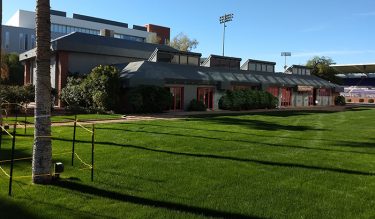
It was figurative in a sense. Built in 1984, the complex had a courtyard that quickly became the go-to gathering spot for socials or just hanging out. But students and staff often had a specific activity in mind when they wondered, “What’s cooking over there?”
You see, there actually was cooking, and not with pots and pans. With kilns. Students made pottery and tiles and melted silver for jewelry. Just imagine: When the temperature outside hit triple digits, the pottery kilns in the complex reached at least a thousand degrees.
Anna Faith Smith, Associate Dean of the College of Theology and no relation to the building’s namesakes, graduated from Grand Canyon in 1980 and then taught classes in the complex when she joined the faculty 10 years later. She flinched noticeably, the heat of her memories still all too vivid, when she was asked what it was like.
“It was hot,” she said. “It was hot.”
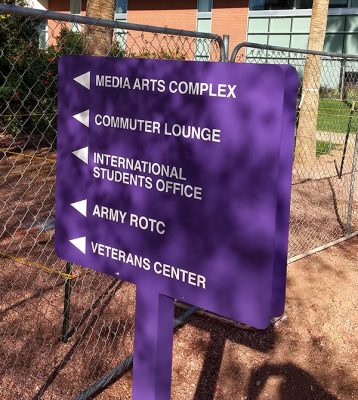
But it also was cool in its own way. With a two-story building in front and, eventually, three one-story wings on the sides and in back, it was like four buildings in one. And like so many campus buildings over the years, it had a multitude of uses.
It was the home of the music, fine arts and theatre programs. The rehearsal room for the choirs and band included grand pianos and specialty musical instruments.
“We had several significant donors, and the Smiths loved fine art,” Smith said.
There was a lighting lab. A photo lab. The costume shop, which outfits all of the Ethington Theatre plays, occupied the second floor. When the famous composer, Samuel Adler, was brought in to conduct two operas in Ethington, he rehearsed at the complex.
In its later years the Media Arts Complex contained the Commuter Lounge, International Students office, Army ROTC and Veterans Center, and a photo studio. It even was connected, until 2015, to the swimming pool that was located where the Student Life Building now stands – Smith remembers the music in the afternoon as students relaxed on the deck.
“It has morphed and morphed and morphed and served us well in its time,” said College of Fine Arts and Production (COFAP) Dean Claude Pensis, who started at GCU two years before the building was opened and is the longest-serving employee at the University.
****
The focal point of the Smith Arts Complex was the main area downstairs, which served as a gallery by day and a gathering spot by night. It was only natural to want to display the students’ pottery and tiles, crafted under the tutelage of Esmeralda Delaney, who still teaches at Glendale Community College.
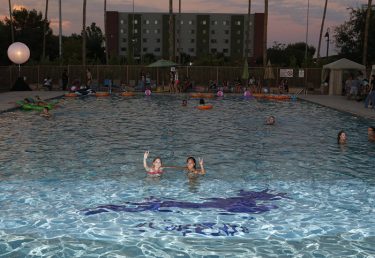
“She would have students make pottery and then would enter them into state tournaments. We did win quite a few of them,” said Assistant Director of Facilities Management Louis Burdick, who arrived at GCU in 1985. “At nighttime they would have gatherings and prayer studies in there. It was sort of like a Student Union.
“Back then, there wasn’t any meeting place that we could firmly say, ‘This is where students hang out.’ We had older buildings that didn’t have any type of courtyard. Building 18 was unique in that aspect. It was actually a very high-traffic building. We were kind of proud of it.”
Smith remembers students sitting in the courtyard at all hours of the day. It was a place they liked to be even though it was on the northern edge of campus.
“It opened out onto an area where there was nothing,” she said.
The north side of the building was strictly for pottery and painting.
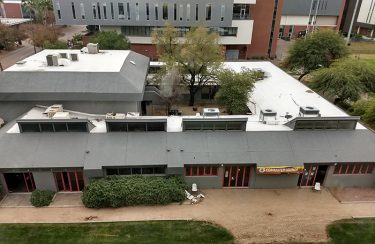
“That’s where the kilns were,” Burdick said. “At first there was one gas kiln and one electric kiln. Eventually we had four electric, three gas. We had one neat one built out of fire block – homemade. It did the raku type of firing. It was pretty unique to the area.
“As the years went on, the arts program expanded to where they started putting kilns in the middle of the courtyard and it became a full performing arts/ceramics class.”
Pensis noted that one of the kilns was for making glass, and “glass kilns are not cheap.”
Smith still has some pottery that students made, and she pointed to all the tiles that have covered the walls – some still were there this week. Delaney’s work was prominent in the gallery, too.
“She made very modern-looking, stylized cats,” Smith said. “You can recognize her work in a flash.”
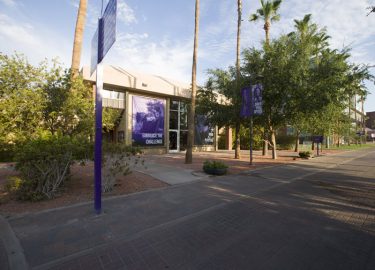
Delaney, who spent 21 years in Building 18 and left GCU in 2005 only because the Fine Arts program was disbanded temporarily, has visited campus annually for Glendale Community College's commencement exercises at GCU Arena. "I'm shocked by how much it's grown," she said.
She was equally shocked to learn that Building 18 was being demolished and talked lovingly of students creating 12-inch square tiles about themselves and having them displayed all around the building. She also was proud to watch two students go on to get their Master of Fine Arts (MFA) degrees, and she fondly remembers an autistic woman who took such joy in turning tiles into crosses, "it became her life."
And the kilns? Delaney insists the heat they emitted wasn't that bad, especially if she and the students opened the two big garage doors on either side of the studio. "They put in a good air-conditioning system," she said.
****
Building 18 will be replaced by the five-story Student Advising Center, which will be the new home of the Antelope Reception Center (ARC), Enrollment and several other departments. To accommodate construction traffic, the walkway to the east and south of GCU Stadium is closed, and pedestrians need to use the Promenade instead.
The Commuter Lounge, ROTC and Veterans Center have moved to the first floor of Kaibab, and the International Students Center is on the second floor of that building. The costume shop moved at the start of the fall semester to COFAP’s new home – the Fine Arts Building, previously the Colangelo College of Business Building.
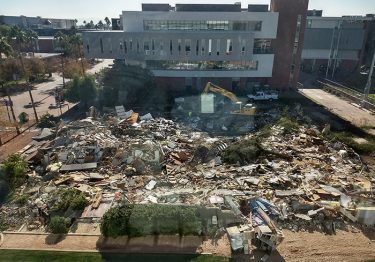
The demolition of Building 18 leaves nine pre-2000 campus structures that are in a state at least close to their original design: Ethington Theatre, Howerton Hall, Fine Arts Building, Academic Administration (formerly Fleming Library), Fleming Hall (now the Lope Shop), Tim Salmon Baseball Clubhouse, Kaibab, North Rim Apartments, and Antelope Gym/Lecture Halls.
That makes their memories – and those of the buildings that are no longer standing – that much more treasured.
“It’s nostalgic,” Smith said. “There are memories I have in each one of the buildings that I know I’ll never get to have again. Even if I go in one of those buildings now, they’ve all changed so much that the place I was in and thing I remember is all in my mind.
“It’s exciting, though, to be here and to see how things morph and turn into something really beautiful. I thought I would be really sad to think about Fleming Hall being gone, but I love the new Lope Shop. It’s beautiful."
She paused and said with a laugh, "I think I morph pretty well.”
Just like the campus. There are plenty of new conversation starters.
Contact Rick Vacek at (602) 639-8203 or [email protected].
****
Related content:
GCU Today: Building 9 showed the power of a utility player
GCU Today: Construction projects cooking, including Taco Bell
GCU Today: GCU bookstore is moving on to bigger and better things



































































